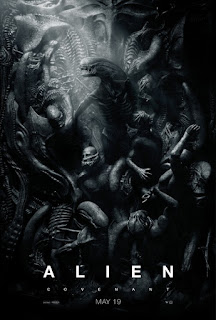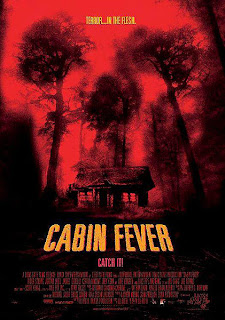More Chest-Bursting: "Alien: Covenant" shifts between bigger goals and splatter but still solid
Alien: Covenant (2017)
120 min., rated R.
Ridley Scott is not being coy this time. “Alien: Covenant” is another prequel to his 1979 sci-fi horror masterpiece “Alien,” but it’s also a sequel to 2012’s “Prometheus,” connective tissue and a stand-alone organism that unfairly sparked a polarizing reaction within the fanboy community. This time out, director Scott and screenwriters John Logan (2015’s “Spectre”) and Dante Harper seem to have made sure to limit the philosophical discussions of creation and not to disappoint with plenty of Xenomorph iconography and gross-out body-horror spectacle. In the process, “Alien: Covenant” tries to satisfy two conflicting modes—the probing of big existential questions and the face-hugging, chest-bursting carnage—as if the claustrophobic, slow-burning “Alien” suddenly morphed into James Cameron’s more action-oriented “Aliens" midway through with ideas of "Prometheus" sprinkled in for good measure. The two halves are not always elegantly spliced together, but taken on a scene-to-scene basis, it hits the spot for one who’s always wanted to see Scott make a space-set “Friday the 13th” with aliens subbing for Mrs. Voorhees.
It’s 2104, fourteen years after Prometheus sole survivor Dr. Elizabeth Shaw (Noomi Rapace) and android David (Michael Fassbender) headed off to reach the home planet of mankind’s creators. The 15-person crew aboard the Covenant is on a colonization mission through space with over 2,000 colonists and embryos in tow, as well as the ship’s synthetic, Walter (Michael Fassbender), an advanced and unflappable 2.0 version. After an accidental fire inside the cryosleep pod of the captain (an uncredited James Franco) takes his life as the rest of the crew is already awakened, the faith-affirming Oram (Billy Crudup) assumes his place as captain to lead the crew, all of them couples, to a new habitable home. Once pilot Tennessee (Danny McBride) receives a rogue transmission from a planet, the acting captain decides they should land and investigate, against the wiser opinion of the former captain’s grieving widow, Daniels (Katherine Waterston). The planet looks like paradise, full of human-planted wheat and vegetation but without any other life in sight. Then, in case it needs to be said, the crew makes some horrific discoveries that lead them to realize the planet is not as hospitable as they’re hoping. Now, where are the acid-blooded aliens?
Right down to the line-by-line reveal of the title card and a prologue with David (Michael Fassbender) and creator Peter Weyland (Guy Pierce), “Alien: Covenant” is very much of a piece with both of its progenitors. With that said, this film almost seems like an apology to the “Prometheus” naysayers, as there’s a tug-of-war between delivering as a solidly icky genre picture and then sometimes aiming higher than that. One might have hoped for fewer half-measures, but director Ridley Scott still knows how to play his audience like a fiddle. Worth the price of admission alone, one pleasingly visceral and harrowing set-piece in which an infected crew member is quarantined by Tennessee’s wife, Maggie Faris (Amy Seimetz), before all hell breaks loose in a medical bay is a showstopper. It’s as vise-gripped and rattling as anything Scott has ever devised and directed, and for the most part, not many other sequences thereafter match this particular one’s heightened panic, anxiety and nasty splatter. The third act grows a bit erratic, with an over-the-top showdown that’s still awesome but seems lifted from a tonally different film, as well as a hurriedly paced shower sex scene with an ‘80s slasher-movie gore shot. The trajectory to the final scene may or may not be meant to be obvious and perversely toying with expectations (a devious and amusingly timed wind-blown hood points to "yes"), but the implication of the consequences to follow for mankind is deliciously bleak.
The idea that the Covenant crew is comprised of married couples theoretically enhances the emotional stakes, but the screenplay does not gain nearly enough mileage out of it; for example, there is a gay couple on board, although it wouldn’t be hard for viewers to miss the hint if they weren’t looking for it. Save for one or two crew members, it’s unfortunate that the characters on hand aren’t asked to be much more than reliably ill-fated fodder for the aliens to burst through and tear apart. An extended scene that more properly established the close-knit crew’s easy rapport was released as a promo clip but was apparently scrapped from the final cut, so it seems almost like a waste for such respectable performers as Billy Crudup, Demián Bichir, Carmen Ejogo, Callie Hernandez, Jussie Smollett, and James Franco (who gets one line in a video message) to show up in negligibly handled roles before getting picked off in gruesome fashion. When a character goes off alone to “take a leak” or “wash up,” the viewer knows he or she won’t be returning with a heartbeat. Even as the audience is steps ahead of them, the characters are at least reasonably unprepared when their fellow passengers are infected with alien spores through an ear canal and up the old nose. And, in order to advance this film’s ties to “Alien,” does someone make the forehead-smackingly foolish decision to put their face where they clearly should not? Of course.
The closest the film comes to offering up an identifiable hero is Katherine Waterston’s Daniels, filling her niche as the film’s de facto Ellen Ripley figure and bringing enough weight with the loss of her husband with whom she planned to start a new life. There is actually even a place here for Danny McBride, who surprisingly brings gravitas as wisecracking, cowboy-wearing pilot Tennessee. On the other hand, Michael Fassbender (one of the key holdovers from “Prometheus”) is outstanding in dual roles as the upgraded Walter and the self-aware, Wagner-loving David. For an actor who’s essentially playing against (and, at one point, kisses) himself on screen, Fassbender navigates between playing two distinctly different androids who share one face but act as good and evil in their objectives. How these androids evolve will be kept a mystery, but Fassbender is mighty chilling with a sly touch of droll humor and brings to life two of the most compelling “people” on screen.
It’s something of a disappointment when a superior “Alien” knockoff called “Life” preceded “Alien: Covenant” two months ago and it didn’t even have Xenomorphs or the badass Ripley-like heroine. As a Ridley Scott-directed film with the “Alien” moniker, this one has too much taut, muscular filmmaking craft on display to complain too much, but it had the potential to be so much more. On a technical level, the film is mostly spectacular. With strains of Jerry Goldsmith’s original score and Marc Streitenfeld’s “Prometheus” score, Jed Kurzel’s piece is unsettling on its own. When cinematographer Dariusz Wolski doesn’t see fit to up the intensity by using a too-jittery shooting style for an attack in a field at night, the cinematography is forebodingly majestic and moody; that misstep is more of the exception than the rule, but it’s not a total deal-breaker. H.R. Giger’s creature design is also still beautiful and grotesque as ever, even if CGI is sometimes too apparent this time around, taking one momentarily out of the film. When all is said and done, “Alien: Covenant” firmly answers the question of whether or not a retread can get a pass and still be worthy of its legacy when it’s this effectively jolting and expertly made. For a franchise that was beginning to jump the shark by crossing over with the jungle-dwelling Predators, this isn’t a bad place to be.
Grade: B
Grade: B













Comments
Post a Comment